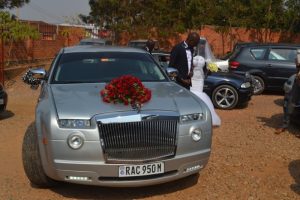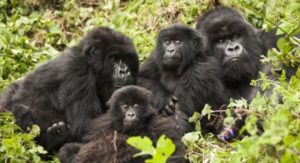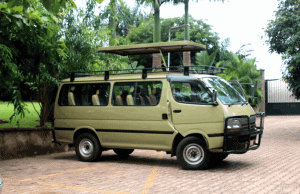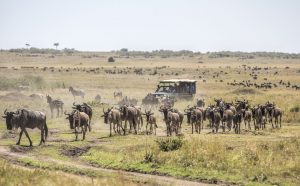Three Reunite With Their Families After Escaping From The Lord’s Resistance Army
Three reunite with their families in Northern Uganda after escaping from the Lord’s Resistance Army
In Gulu, a northern district of Uganda, 3 escapees (Oryem Bosco, Owong Sam and Okot Stephen) who have been held captive by the mercilessly brutal Lord’s Resistance Army led by Joseph Kony step home after a decade of killing civilians and military, looting and executing other criminal activities against their will. Stephen Okot who says he was abducted at the age of 16 to fight for the LRA got a chance to escape after making a rare friendship when in the bush. Okot had for long kept quiet not until by chance he opened up and started interacting with Oryem Bosco, a short, shy man slightly younger than him, about their childhoods in northern Uganda. “I told him my ancestral place only to realize we came from the same district,” Okot said.
Since then, Okot and Bosco started sharing food and as they enjoyed eating together, they laughed together, contemplating the 10 years they had spent away from their families, whispering about what they witnessed happening around them including the brutal killings, illiteracy among the fighters and the paleness of their future.
The LRA which is a cult-like rebel group led by Joseph Kony has been in operation in northern Uganda for almost a decade and a half brutally murdering an estimate of 100,000 civilians and displacing 1.7 million into concentration camps, nearby urban centers and neighboring countries.
Its fighters kidnapped tens of thousands of children, turning them into child soldiers and killers who carried out rapes, looting, torture and massacres prior to the group getting overwhelmed and defeated by the Uganda People’s Defense Forces in 2006 with help from other militia groups like Amuka Boys from Lango sub-region and Arrow Boys from Teso sub-region. The rebel group fled into the Democratic Republic of Congo and the Central African Republic. Last year, the United States ended its seven-year support for the hunt of Joseph Kony, withdrawing the funding that motivated LRA defections through leaflets, loudspeakers and local radio broadcasts.
Paul Ronan, from the non-profit Invisible Children, warns that the group remains at large and a threat with several hundreds of them scattered throughout Congo and the Central African Republic abducting at least 160 civilians this year alone, according to Invisible Children’s LRA Crisis Tracker. All these crimes combined together put Joseph Kony on an A list of the most wanted War lords in the world by the International Criminal Court but the LRA seems to still be holding together and Joseph Kony is believed to have settled in Sudan. With the United States and Ugandan military forces withdrawing from the fight, encouraging defections is considered to be the best way to crack down the remaining rebel forces confirmed by the 343 defections in the past four years.
In isolation and guilt, the remaining fighters worry that if they are to abandon Kony, they will be punished for crimes they have committed and they are also caged in an environment where captives inform on each other for promotion and commanders punished for their being kind by firing squad for even thinking of escaping, according to Okot, which is what made his bonding with Bosco so important. As they grew closer, they found a third confidant in Owong Sam, a charismatic man with a hearty laugh who was abducted at the age of 9.
“I began loving Sam. I began loving Bosco. They were people I could trust,” said Okot, sitting in a guarded reception center in Gulu, in northern Uganda, several months after the three finally escaped.
It was Sam, now 26, who first suggested leaving. Because of his favored status, he had been given a wife — another captive — and now had a daughter. “I thought [about how] I was abducted when I was a child,” Sam said. “My daughter isn’t studying. I wanted to bring her back home to get an education.” So, Sam reached out to his friends. “Our future is going nowhere, but still we can manage our way out,” he recalled saying. “If you want a better life, you should pack, but don’t tell anyone or I will be killed.”
Their opportunity for a successful escape came when they were ordered to escort their commander to meet Kony called in Darfur, western Sudan and on their way back, they sneaked away at night while others slept with the three men assisting Sam’s family, which had now grown to two children.
Together they made the long journey from Sudan,via the Central African Republic to the border with Congo trekking on foot. Until last year, there used to be U.S. Special Forces assisting escapees to return to Uganda unfortunately, now it’s the work of local Ugandans especially David Ocitti, who runs an organization called Pathways to Peace where in June he traveled to Banda, in northeastern Congo, to greet the escapees and begin the slow process of finding their families and flying them back home.
Four weeks later, 16 years of separation ended when the three were finally reunited with their families in Gulu leaving women in ululation. Fathers and uncles quickly lifted the returnees into the air amid shouts of joy. “My dad’s gotten fatter,” Sam joked smilingly.
A sister, who Sam thought had been killed in a gunfire exchange with government forces, delightedly introduced him to her children and Sam’s mother pulled him onto her lap and held him there, with her eyes closed for at least 5 minutes. Interestingly, Okot and Bosco discovered that their families were related and they were actually distant cousins. All three escapees have been granted amnesty by the Ugandan government and will not face any judicial charges for the crimes they committed while in the bush against their will.
Defections and reunions are generally celebrated by northern Ugandans, who consider it as a necessary step towards peace-building though many families are still waiting for news of their missing sons and daughters, defectors say not more than 60 Ugandans are left in the group of LRA captives.
“Still, rejoining civilian life will not be easy. I call this the honeymoon period,” Ocitti said. “Usually the post-traumatic stress disorder kicks in six months to a year later. Now, so many people are coming with gifts, sweet words, but after a year they have to face their real life.” And local counselors say at least two LRA escapees have killed themselves over the past few years and children born in the bush can be rejected and neglected by their parents’ families, and other escapees have developed addiction problems or experienced hostility from neighbors.
With no education and experience, many cannot find work. “They want you to be a total fool,” Okot said of the LRA, explaining the illiteracy in them. When they return to their communities, after several weeks of guidance and counseling, there will be a welcoming ceremony which involves prayers and defectors stepping their feet on an egg as a cleansing ritual to signify a fresh start.
Bosco said he never thought their escape would work, and now that he is finally home, he is convinced that the evil that robbed him of his childhood and family may one day surely ends.
“Everything has a beginning and an end,” he said. “Nothing is impossible before God.”





